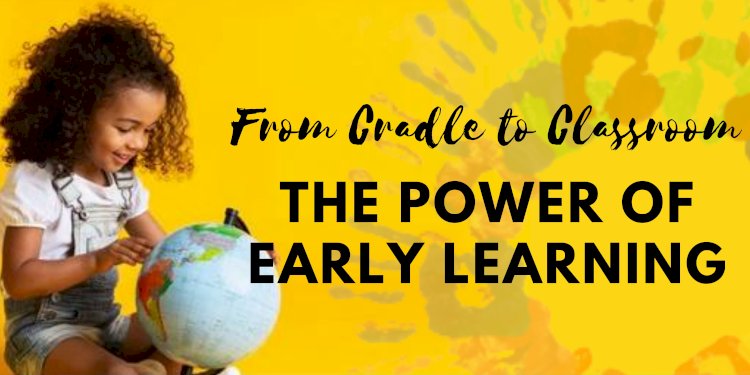From Cradle to Classroom: The Power of Early Learning
This article explores the pivotal role of early education in shaping a child's future, emphasizing its profound impact on cognitive, emotional, and social development. Investigating various approaches like the Montessori method, play-based learning, and the Reggio Emilia approach, underscores the importance of fostering curiosity and independence during these formative years. Additionally, the article compares home and school education, highlighting the advantages of personalized attention at home and the structured environment of traditional schools. Ultimately, it concludes by asserting that investing in early education is an investment in the holistic development of children, moulding them into confident, inquisitive individuals poised for academic success and personal growth.
By Shreya Rajvanshi Gangal

In the intricate tapestry of a child's development, the early years serve as the foundation upon which their entire educational journey is built. The importance of early education cannot be overstated, as it lays the groundwork for cognitive, emotional, and social development. This article explores the significance of early education, delving into various approaches and comparing the dynamics of home-based and traditional school environments.
The Significance of Early Education: Early education acts as a catalyst for intellectual growth, fostering a love for learning that lasts a lifetime. Research consistently highlights that children who receive quality early education are better equipped to excel academically, develop strong social skills, and exhibit enhanced problem-solving abilities. The brain's plasticity during these formative years makes it an opportune time to instill a love for exploration and discovery.
Various Approaches to Early Education:
-
Montessori Method: This child-centric approach emphasizes hands-on learning and self-directed activity. It encourages children to explore their interests at their own pace, promoting a sense of independence and curiosity.
-
Play-Based Learning: Recognizing the importance of play in a child's development, this approach integrates educational content into activities that are enjoyable and engaging. Play-based learning enhances creativity and critical thinking.
-
Reggio Emilia Approach: Originating in Italy, this approach views children as active participants in their own learning. It emphasizes the importance of the environment, fostering creativity through art, exploration, and collaboration.
Home vs. School Education:
-
Home Education: The intimate setting of home allows for personalized attention, catering to a child's individual learning style. However, potential drawbacks include limited social interaction and exposure to diverse perspectives.
-
School Education: Traditional schools offer structured curricula and socialization opportunities, preparing children for a communal environment. While beneficial, the challenge lies in adapting to diverse learning needs within a larger class setting.
Conclusion: In the grand symphony of a child's education, the early notes resonate the longest. Early education shapes not only academic success but also the very essence of one's character and approach to the world. Whether through innovative methods like the Montessori approach or the structured setting of a traditional school, the crucial point remains: investing in early education is an investment in the future. As parents, educators, and policymakers, the responsibility to nurture young minds lies in recognizing the importance of these formative years, ensuring that each child has the opportunity to blossom into a well-rounded, inquisitive, and confident individual.
What's Your Reaction?



















